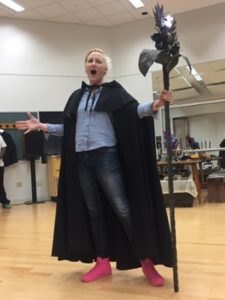Dido and Aeneas staged at Abbott Auditorium
The SIUE Opera Theatre has performed Dido and Aeneas at the Abbott Auditorium, housed in the Lovejoy Library. The performance was staged Oct. 14-15. Dr. Marc Schapman of the Department of Music, who is also the co-director of the SIUE Opera Theatre, directed the production.
Dido and Aeneas is a 17th century opera written by Henry Purcell. The opera is three acts and is a love story with a tragic ending. Dido, the queen of Carthage, falls for the Trojan hero Aeneas. The relationship, however, is compromised when a witch plots to bring down Carthage and its queen, using Dido and Aeneas’s love as the device to accomplish this end. To do so, the witch employs a trusted elf servant to disguise itself as Mercury and convince Aeneas to leave Carthage and conquer contemporary Italy to establish a new Troy on Latin soil.
Continue about Dido and Aeneas later.
Assisting in this production is sophomore Zora Vredeveld with her Undergraduate Research and Creative Activities (URCA) project. Vredeveld, a music major with an emphasis on musical theater and musical performance, undertakes the duties of publicity, stage management, props, costumes, and stage positions. She explains that through her URCA project, she will be a part of one production – Dido and Aeneas fulfills this – as well as perform in one musical.
Speaking about the production, Dr. Schapman says operas are more than just singing: acting is involved as well. He explains that performing in an opera is a rigorous task because the performers do not just stand still when singing, but also run across the stage, making proper breathing control a necessity.
Discussing the SIUE Opera Theatre more broadly, Dr. Schapman says during their freshman year, the students learn the International Phonetic Alphabet (IPA) to enable them to sing in other languages with proper pronunciation without knowing the language. Though Dido and Aeneas is sung in English, other productions use German, French, and Italian. Carmen, he notes, is sung in French, while Don Giovanni is sung in Italian.
When talking about operas as a whole, Dr. Schapman explains that beyond the rigorous singing, operas tell a story. They have different scenes, character development, and includes acting. While some operas do have speaking parts, known as recitative, others, like Dido and Aeneas, conduct dialogue through singing parts.
Dr. Schapman notes that other works are being adapted into operas by what are called librettists. One example of such is the opera adaptation of the classic play The Crucible, a play about the Salem Witch Hunt.
Filed Under: Uncategorized












